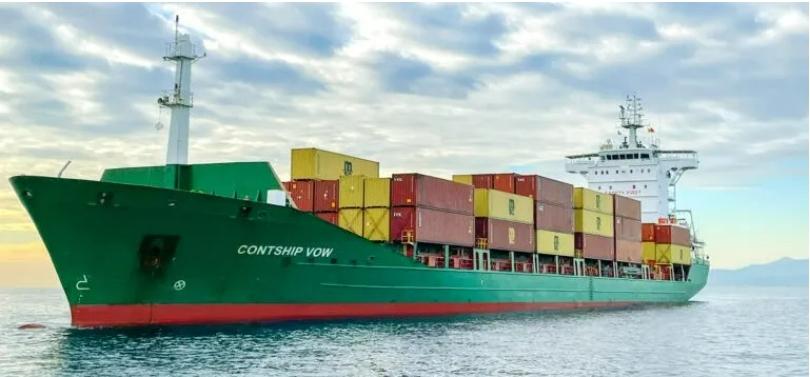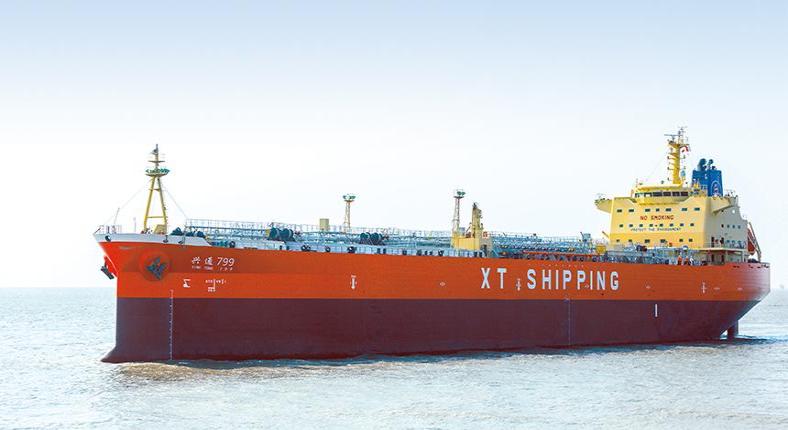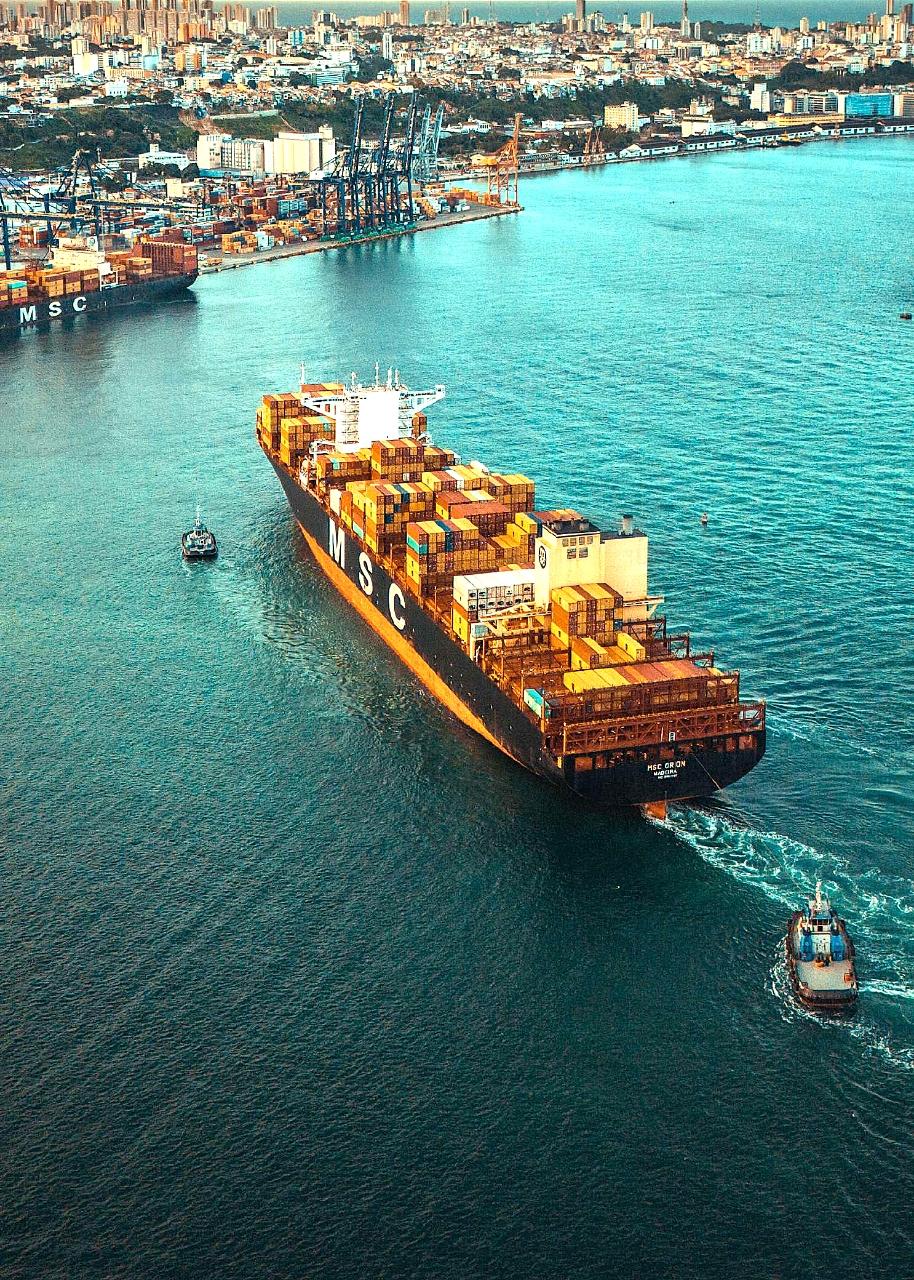【关键词】SOF、Laytime 、Weather working day、事实
在航运实践中,经常会碰到各种各样的延误,在海上会遭遇恶劣天气,比如碰到台风需要漂航等,如果是程租航次,依据Diplock勋爵在The “Johanna Oldendorff”案中的权威表述,属于第一预备航次阶段(The loading or approach voyage)和第三载货航次阶段(The carrying voyage),那么这些延误等船东自行承担。但是在抵达装卸港,递交有效的NOR之后,船东就将延误的风险转嫁到租家身上。而此时,如果再有延误,比如压港,坏天气等将由租家承担,除非租船合同中另有条款规定。
对船东而言,时间就是金钱,因此如果租家造成了滞留,租家就得按合约支付滞期费, C.Q.D.的合同除外;当然当事人也可以在该合同下另行约定Detention的金额,如果有这种规定,那么租家仍得为延误付出金钱上的补偿,不管是demurrage计算,还是按detention计算。如Devlin法官在Compania De Navigacion Zita S.A. v LouisDrefus & Cie案中所说: 船东的愿望是实现船舶的快速运转,时间对他来说就是金钱。约定固定的装卸时间,滞期费是对装货滞留的惩罚,而速遣费是对迅速作业的奖励。
The shipowner's desire is to achieve a quick turn-round; time is money for him. The object of fixing lay days and providing for demurrage and dispatch money is topenalize dilatoriness in loading and to reward promp titude.
而作为laytime计算最重要的依据,有效的NOR和事实记录(SOF-Statement of Fact)就显得异常重要。近期有人前来咨询这方面的内容,涉及超过16万美金的争议。因此感觉有必要在之前那篇介绍SOF的文章的基础之上再来说说laytime计算的相关问题。
基本情况是,承租人与出租人就Y轮签订程租合同,承租人安排到莫桑比克的Quelimane装钛铁矿沙。Y轮于6月22日2200抵达并递交NOR,在2310抛锚等装货,如下SOF显示,显示NOR已经被接受(Accepted),而且该轮在抵达外锚地未抛锚的情况下就递交NOR,递交过早。该NOR事实上是无效的,但已经被接受了,承租人又构成了弃权及禁反言,这方面的可以参之前关于The “Happy Day”的文章。

由于在锚地装货,受到到涌浪等影响,从6月24日开始,直到7月15日才装完货,总共装了49,850.05吨,前后用了差不多20天。其中一部分的SOF记录如下,船长未在该SOF做批注,未提出抗议。
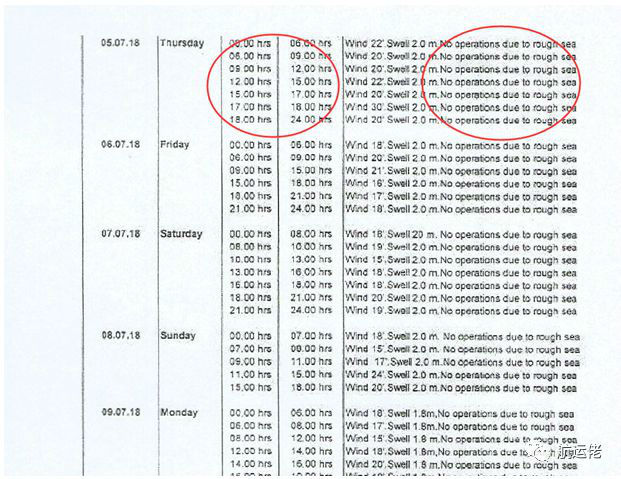
未能装货的时间,SOF上的批注为:“Wind xx, Swell xx.No operation due to rough sea”。承租人认为这些时间损失不能计算装卸时间,而出租人对此提出异议。依照合同中约定“SUNNY DAY BUT ROUGH SEA, NOT TO BE CALCULATED AS LAYTIME, UNLESS LOADING IS STILL BEING PERFORMED. ROUGH SEA WHERE LOADING IS POTENTIALLYPREVENTED IS DEFINED AS WAVE HEIGHT IN EXCESS OF 1.3 METRES. ” ,“浪高(wave height)超过1.3米计入ROUGH SEA”。代理在装货期间SOF的记载中描述的均是SWELL HEIGHT XX米,出租人不让船长在SOF上签字,认为WAVE 与SWELL有区别,后出租人要求按照其航海日志记载的内容核算LAYTIME,但船长航海日志只是浪的级别,而非具体明确的浪高,且大都数记载均为浪高四级(1.25米-2.5米),因此四级浪高里无法认定浪高究竟是在1.25-1.3m范围内还是1.3-2.5m范围内。承租人不认可出租人将所有的四级浪界定为不超过1.3米的情形。后来出租人又委托了第三方气象公司STORMGEO针对装港装货点装货期间(历史期间6月22-7月22)的气象水文信息做了进一步的收集并出具了一份关于风力、浪高和涌高的数据。但这个第三方提供的数据和SOF关于涌高的描述以及航海日志关于浪高的描述有差距。
合同的相关条款如下:
8.OWENER’S AGENT AT BOTH PORTS: CHARTERER APPOINT THE LOADING PORT AND DISCHARING PORT AGENT.OWENER PAY PORT CHARGE/AGENCY FEE.
10.LOADING RATE:4,000MT PER WEATHER WORKING DAY, SATURDAY SUNDAY HOLIDAY INCLUDED
11.DISCHARGING RATE:15000 MT/DAY PWWD SSHINC
28. SUNNY DAY BUT ROUGH SEA,NOT TO BE CALCULATED AS LAYTIME, UNLESS LOADING IS STILL BEING PERFORMED. ROUGH SEA WHERE LOADING IS POTENTIALLY PREVENTED IS DEFINED AS WAVE HEIGHT IN EXCESS OF 1.3 METRES.
29.ALL DISPUTESARISING FROM OR IN CONNECTION WITH THIS CONTRACT SHALL BE SUBMITTED TO HKIAC FOR ARBITRATION IN ACCORDANCE WITHITS RULES OF ARBITRATION IN EFFECT ATTHE TIME OF APPLYING, ENGLISH LAW APPLIES.
30. OTHERS AS PER RECENTLY EXECUTED GENCON CHARTER PARTY 1994 .
32. THE PRINCIPLE OF 'ONCE ON DEMURRAGE ALWAYS ON DEMURRAGE' TO APPLY DURING THIS CHARTER.
现在问题来了,这些受到涌浪影响,未能装货的时间损失是否应该算Laytime?出租人坚持认为应该计算,承租人认为是坏天气不应该计算,双方是否有充分的理据?
首先来看关于SOF的重要性问题。
一、SOF的证据价值
在The“Khian Captain”[1985] 2 Lloyd’s Rep212案中,涉及的主要争议是“Khian Captain”轮在卸港从1975年的7月7日0800到7月8日半夜之间的时间延误是否算正常卸货时间。卸港的SOF,抬头为“Detention”的在该期间备注为:“As the vessel worked entirely in stream and due tidal conditions vessel worked accordingly tide times.”。船长也在SOF上添加了批注: “Previously with the same weather conditions discharge carried out”。
其中关于SOF部分,Saville法官在第214页判决书中说,前提是事实记录确实提供了当天恶劣天气的一些初步证据。船舶过去可能在类似条件下工作的事实并不一定表明这种类似的情况不能被排除,因为它不是好天气工作日。但正如法官他所看到的,承租人案件的困难在于,即使根据他所作的假设,事实记录在确定天气阻碍整个有关时期卸货方面的工作还远远不够,而法官他看到该文件,指出由于恶劣的天气条件,下午潮汐不会有驳船。这种状况持续了多久还是相当不确定的,事实上早上的情况就是如此。Saville法官认为,承租人应根据可能性的平衡来确定,在辩称不是好天气工作日的天气期间,天气不允许工作,而且这在法官他看来是无法实现的。Saville法官无法从他面前的证据中看出,在这段时间内,天气不允许船舶作业。此外,在Saville法官看来,事实记录并不足以让他确定应该进行一些分摊和给予一些救济,仅因为他对那两天天气的位置和持续时间处于完全不确定的状态。
The difficulty with Mr. Caldin's case, as I see it, is that even on the assumption which I have made, the statement of facts does not go far enough in establishing that weather prevented working for the whole of the period in question, and I read the document as indicating that no barges were received on the afternoon tide because of adverse weather conditions. How long that state of affairs lasted is left quite uncertain, as indeed the position in the mornings. I take the view that it is for the charterers to establish on the balance of probabilities that for the periods claimed not to be weather-working days the weather did not permit working, and this, in my judgment, they failed to do. I am unable todiscern from the evidence before me that for the period in question the weather did not permit the working of the vessel. Furthermore, the statement of facts does not, to my mind, disclose enough for me to determine that some apportionment should be made and some allowance given, since I am left in the state of complete uncertainty as to the position of the weather and its duration on those two days.
在High Seas Venture Ltd Partnership V Sinom(Hong Kong) Ltd [2007] EWHC 673 (Comm) (29 March 2007) [2007] EWHC 673(Comm)- The“Newforest”案中,关于事实记录,商事法院的法官认为,正如他所看到的那样,SOF不是最终的和有约束力的,因为它没有这样说,而且因为“基于”这些词没有足够清楚地指出最终的情况。类似地,描述SOF的效果可能太过于教条化,因为它会扭转举证责任。“相互”这个词或许是草拟人员无益的选择,但是,无论是否达到必要的相互关系,不管其合同状态如何,SOF无疑都有很强的证据价值。我们有一份由船长当时证实的事实陈述,尽管很久以后由港务局确认。由于这是一个专门的法律领域,这是一个有力的证据,在任何民事案件中都可以反对潜在的自我回忆和重建不起眼的和详细的事实,尽管两年后天气记录和其他同期文件得到了协助。一般来说,这些证据有可能解除承租人的举证责任,除非出租人证明它是错误的,这是一项需要超过推测并需要说服现场证据和/或有说服力的同期文件。法官认为虽然这一因素对他的判决没有影响,法庭应该更倾向在有事实记录这类文件的基础上作出判决,事后证据在证明力上较差。
As I see it the SoF is not final and binding because it does not say so and because the words" on the basis of" do not point clearly enough to finality. Similarly it may be too dogmatic to describe the effect of the SoF as reversing the burden of proof. The word "mutually" is perhaps an unhelpful choice by the drafts person but I take it to mean , at the least,around the same time. But the evidential value of the SoF is unquestionably strong whether or not the requisite mutuality is achieved and almost regardless of its contractual status. We have a statement of facts prepared on the spot by the agentconfirmed at the time by the Master and, albeit much later, by the Port Authority.Stepping back from the fact that this is a specialised areaof law, that is powerful evidence in anycivil case to set against potentially self serving recollection andreconstruction of unremarkable and detailed facts, albeit assisted by weatherrecords and other contemporaneous documents two years later. In general this evidence is likely to discharge the Charterers' burden of proof unless the Owners show it to be wrong, an exercise which requires more than speculation and needs convincing live evidence and/or persuasive contemporaneous documents. Further, although this factor plays no part in my decision, the court should lean towards seeing finality when documents like the SoF are available as the unsatisfactory exercise which I must now conduct confirms.
从以上法官陈词可以看出,虽然SOF不是最终的和有约束力的,但是,无论是否达到必要的相互关系,不管其合同状态如何,SOF无疑都有很强的证据价值。一般来说,这些证据有可能解除承租人的举证责任,除非出租人证明它是错误的,这是一项需要超过推测并需要说服现场证据和/或有说服力的同期文件。法庭应该更倾向在有事实记录这类文件的基础上作出判决,事后证据在证明力上较差。
因此回头看前面的SOF,未能装货的时间,SOF上的批注为:“Wind xx, Swell xx.No operation dueto rough sea”。O轮的船方对此没有提出异议,或者至少说对于未能作业这种事实没有提出异议,尽管出租人事后声称代理人在事实记录上描述的涌浪高度不对。
Y轮Laytime计算的最主要争议是,出租人事后委托了气导公司对在6月24日到7月15日期间,对当时锚地涌浪高度进行了重新评估,认为代理在SOF上记录的涌浪高度有误,不准确,因此拒绝承认该SOF。那么来到第二个问题,代理人问题。
二、代理人的法律意义
参合同第8条如下:
8.OWENER’S AGENT AT BOTH PORTS: CHARTERER APPOINT THE LOADING PORT AND DISCHARING PORT AGENT.OWENER PAY PORT CHARGE/AGENCY FEE.
这里明确说,装卸港的代理由承租人指定,出租人委托并作为出租人的代理。
再来了解一下这个“代理人”的含义,可参如下:有明示的(口头或书面)或暗示的授权代表另一方(委托人)行为的,委托人与其他当事人订立契约关系的一方。代理在委托人,也有责任在其控制之下,在委托人授权范围内行事,其行为将代表委托人的行为。在明确的授权之下,将有额外的权限,但对于委托人的货物代理无权转为其所有,除非代理人的留置权适用。一般来说,广告代理商不属于代理的定义,因为他们代表客户购买服务。
Party that has express (oral or written) orimplied authority to act for another (the principal) so as to bring the principal into contractual relationships with other parties. An agent is underthe control (is obligated to) the principal, and (when acting within the scope ofauthoritydelegated by the principal) binds the principal with his or her acts.Additional powers are assigned to agent under the legal conceptof 'apparent authority.' The agent, however, does not have title to the principal's goodsinhis or herpossession, except where agent's lienis applicable. In general,advertising agencies do not fall under this definition of an agent, because they act as principals for the servicesthey buy on behalf oftheir clients.
简单点如下,根据代理关系,一方同意并获得授权代表另一委托人,以具有法律约束力的个体,与第三方经行特定的商业交易。One who agrees and is authorized to act on behalf of another, a principal, tolegally bind an individual in particular business transactions with third parties pursuant to an agency relationship.
再简单点,如Sumption勋爵在The“Global Santosh”案中说的,严格来讲,代理人是委托人授权为其行事的人。
Strictly speaking, an “agent” is a person authorized by the principal to perform some act on his behalf.
又如Evens勋爵在The“Arctic Trader”案中,认为第三方发货人应该被认为是租家的代理人。
It is clear, in our judgment, that when the time charterer instructs the master, pursuant to the employment provisions of clause8, to receive certain cargo on board, and the cargo is loaded at thecharterer’s expense, although under the supervision and maybe at the risk ofthe shipowner, then the cargo is loaded by or on behalf of the charterer forthe purposes of the charter-party, and a third party shipper should be regardedas the charterer’s agent accordingly.
对于代理人的解释问题,Diplock勋爵在Teheran-Europe
v. Belton (Tractors) [1968] 2 Lloyd’s Rep. 37案中第41页判决书中说到,如果代理人具有这样的实际权限并且与其他有意代表其委托人签订合同的人签订合同,则无论他是否向另一方披露其委托人的身份,或者即使他代表负责人签订合同,如果另一方愿意或引导代理人相信他愿意作为合同的一方对待代理人可能被授权合同的任何人。在普通商业合同的情况下,另一方的这种意愿可由代理人承担,除非另一方表明其不愿意或有其他情况导致代理人意识到另一方不那么愿意。
Where an agent has such actual authority and enters into a contract with another party intending to do so on behalf of hisprincipal, it matters not whether he discloses to the other party the identity of his principal, or even that he is contracting on behalf of a principal atall, if the other party is willing or leads the agent to believe that he is willing to treat as a party to the contract anyone on whose behalf the agentmay have been authorized to contract. In the case of an ordinary commercial contract, such willingness of the other party may be assumed by the agent unless either the other party manifests his unwillingness or there are other circumstances which should lead the agent to realize that the other party was not so willing.
可以参之前文章介绍的The“Isabelle”案。在该案中,RobertGoff法官认为这个条文可能缺乏明确性,但他确信,就其真正的解释而言,只是指在相关的港口将船舶交给的代理人,也就是说在那个港口作为船舶代理人,应该是租家为此提名的代理人。这个结论是从该条款中使用的词语中得出的,但是通过信息得出这样的结论是强有力的,即在一些仲裁中海事仲裁员得出了同样的结论,有趣的是,在下一版的Shellvoy的格式中是毫无疑问的。此外,根据法院代理以普通方式作为船舶代理人行事的证据,向船东管理代理人提供信息,处理向船舶提供燃油,水和现金,并向船东支付在Bejaia港的船舶和代理费。而关于准备就绪通知书,没有证据表明代理以任何方式作为租家的代理,但是对于航次租船人的港口代理人(而不是定期租船人的代理人)。事实上,即使是船长的电报准备就绪通知书,表面上也没有被送到代理作为承租人的代理人,而是作为船舶代理人传送给他们进行转发。在这种情况下,RobertGoff法官认为,即使代理给了船舶等泊的命令,但他们从来不是租家为此目的的授权代理。
Y轮争议中的代理人由出租人委托,依据这些权威,代理为出租人授权为其行事的人;更何况合同中已经明确列明,作为出租人的代理,而不是承租人代理。因此出租人代理的行为代表了出租人,出租人不可以事后反过来说自己代理记录的不准确,禁反言原则将适用。
接下来来看出租人所主张的,涌浪高度未超过1.3米,或者只是涌,不是浪,因此未能作业的时间不能扣除不算laytime。
三、合约解释
如之前文章多次提到,合约解释应该将前后文条款当作一个整体来看待,而不能孤立单独看其中的某个条款。如Sumption勋爵2017年5月8日在牛津大学所做的题为《A Question ofTaste: The Supreme Court and the Interpretation of Contracts》的演讲所说。
当事人双方协议的言辞应作为一个整体来解读,这是唯一可以采纳的能够证明当事人双方意图的直接证据。我一定不会主张将文字主义作为解释的一种方法,但是如果认为,语言只是在某些特定的背景下才有意义,这是一个谬误。大多数语言和所有正确起草的语言都具有其自身意义。我发现贬低词典和语法作为解释的手段是非常不正常的。语言是一种沟通方式,其功效取决于是否接受了一些使人们能够理解的惯例。词典和语法只是记录这些惯例的参考书。如果我们放弃了将把它们作为基本的解释工具,我们就不再能发现各方是如何相互理解的。我们只是让法官来重建一份理想的合同,而这点双方当事人可能会更合适,但实际上从未做到。
先来看看相关的第10条和第28条,描述如下:
10.LOADING RATE:4,000MT PER WEATHER WORKING DAY, SATURDAY SUNDAY HOLIDAYINCLUDED
28. SUNNY DAY BUT ROUGH SEA,NOT TO BE CALCULATED AS LAYTIME, UNLESS LOADING IS STILL BEING PERFORMED. ROUGH SEA WHERE LOADING IS POTENTIALLY PREVENTED IS DEFINED AS WAVE HEIGHT IN EXCESS OF1.3 METRES.
第10条是关于装率描述的,稍后再来详细解释“weatherworking day”的具体含义。而第28条字面解释起来就是:晴天但是大浪,不计算装卸时间,除非仍然在继续装货。浪高超过1.3米的可能阻止装货的即为大浪。其实这个描述是有出路的,在国际通行的蒲式浪级表,如下图所示,超过5级风对应的海况才能被称为是Rough sea,而此时浪高高度超过2.5米,浪高高度在2.5米到4米之间的被称为rough sea。但是订约自由,这里约定的是超过浪高1.3米即视为大浪,延误时间不计算装货时间。依据代理的SOF,基本上都超过了1.3米,因此承租人主张扣除不计算laytime理由正当。
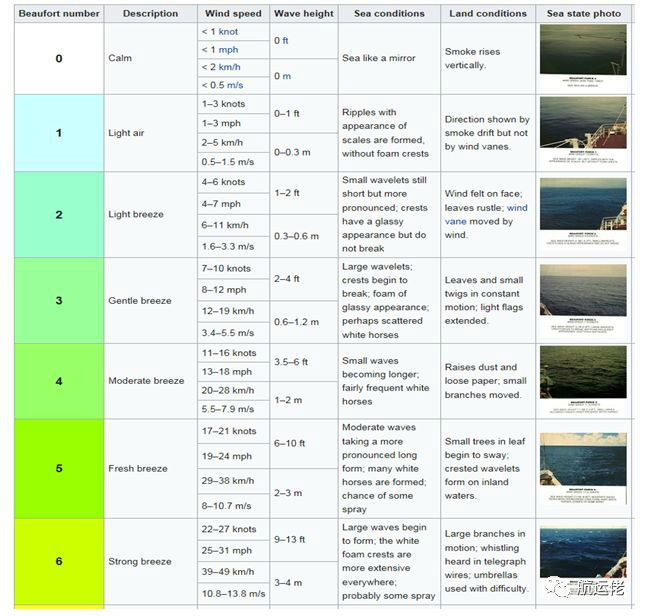
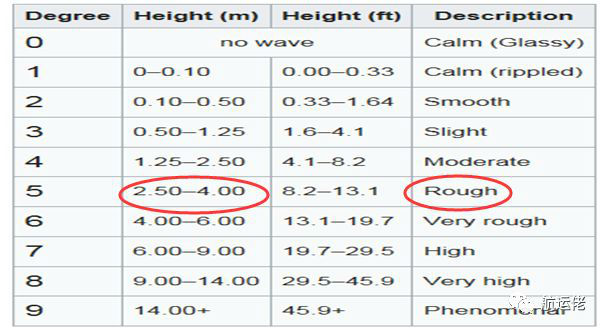
出租人在这里曾经辩称是代理在SOF标志的是swell,不是合同约定的wave,因此SOF无效。这点,笔者认为没有辩解的必要,swell和wave很多时候都一起的;何况还是出租人自己的代理。作为合约的恰当解释问题,第28条的恰当解释,当事人的真正意图是,影响了装货作业的时间需要扣除不算,而不是这个浪高是1.3米还是1.2米,或者2.0米。因此,依据出租人代理所提供的SOF,清楚显示受涌浪影响,装货作业停止。如果出租人对此有异议,那么船长在当时,应该提出严重抗议。比如拍照取证,证明当时并没有驳船在船边,而不是代理所说的因为涌浪原因导致装货作业中断。相反,如果出租人能证明,SOF所记录的那些未作业的时间内,装货锚地风平浪静,装货作业中断的原因是没有驳船,或者没有货等原因导致的中断,那么情况将不一样。
那么作为合约解释,应该将前后问条款一起来解读。接下来就来看看关于第10条的解释问题。
10.LOADING RATE: 4,000MT PER WEATHER WORKING DAY, SATURDAY SUNDAY HOLIDAY INCLUDED
四、Weather working day
关于这个“Weather working day”的解释问题,国内很多人将这个翻译为良好天气工作日,或晴天工作日。如果翻译成良好天气工作日,那么“Good weather working day”又将作何翻译?如果翻译成晴天工作日,显然也不是,因为很多货物,比如铁矿煤炭,在阴天甚至下小雨天,都是可以正常作业的,而这些阴天小小雨天都算是weather working day,但并非晴天。
参BIMCO No. 8 – 10September 2013号通函,《Laytime Definitions for Charter Parties 2013》对于“Weather working day”的解释如下:
WEATHER WORKING DAY shall mean a Working Day or part of a Working Day during which it is or, if the Vessel is still waiting for her turn, it would be possible to load/discharge the cargo without interruption due to the weather. If such interruption occurs (or would have occurred if work had been in progress), there shall be excluded from the Laytime a period calculated by reference to the ratio which the duration of the interruption bears to the time which would have or could have been worked but for the interruption.
“Weather working day”是指在船舶仍在等泊,将有可能装/卸货物不受天气的影响的工作日或部分工作日。如果发生这种中断(或如果船舶已经在装卸作业过程中将会发生这种中断),那么应该根据该中断的持续时间与已经或可能已经工作的时间按比例计算,从装卸时间计算中扣除。
可能这种扣除不是很好理解,BIMCO对此又给出解释,“Weather working day”,坏天气的扣除是参考船舶正常作业时间(或轮流等泊)的中断长度再基于24小时计算出来的。因此,在8小时工作日期间停工两小时,按比例为6小时(或在12小时工作日的情况下为4小时),然后将时间加到装卸时间计算结束。在正常工作时间之外发生的下雨不予扣除。
WEATHER WORKING DAY deductions for bad weather are calculated by reference to the length an interruption during a vessel’s normal (or notional if waiting on turn) working hours bears to a period of 24 hours. Thus, a two hour stoppage during an eight hour working day is pro-rated to six hours (or four hours inthe case of a twelve hour working day) and the time then added to the end of laytime. No deductions are made for rain occurring outside normal working hours.
为方便理解该条款,举个例子,如果一天的工作时间为8小时,比如从早上0900到下午1700为工作时间,那么在此期间(0800-1700)下雨两小时,那么一整天计算就是6小时,可以扣除不算装卸时间。如果工作时间为12小时,比如从0800到2000,在该期间(0800-2000)下雨两小时,换算成一天就是4小时,可以扣除不计算装卸时间。但是如果下雨发生在早上0200-0400,不在工作时间内,那么就不得扣除,所有时间都得正常计算装卸时间。
这里解释的也都是可以装卸货作业,对天气是晴天还是阴天还是下雨并没有说明,因此,笔者认为“Weather working day”翻译为天气适宜工作日比较恰当,虽然和(workingday )weather permitting有点类似。
因为装港24小时作业,不存在在工作时间外发生的问题,这方面的不在本文考虑。依据BIMCO对此的解释,如下SOF记录的部分,受坏天气影响,无法作业的时间将需要从装卸时间计算中扣除不算。
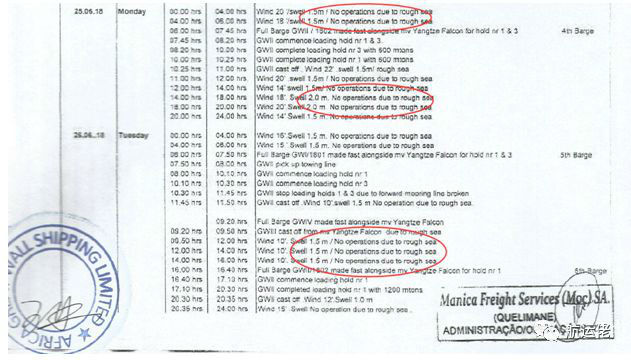
对于“Weather workingday”的解释问题,也可以参最新第7版的《Laytime and Demurrage》Chapter 1-General Principles,2.46如下:
2.46 A weather working day is a type of working day. It is a working dayon which the weather allows the particular ship in question to load or discharge cargo of the type intended to be loaded or discharged, if she is then at a place or position where the partiesintend her to so load or discharge. If she is not in such a position but is still awaiting her turn to berth, then it will count as a weather working dayif the weather would allow that type of cargo to be worked at the berth where the parties intend the vessel to go. It is immaterial whether work is intended on the particular day.
天气适宜工作日是工作日的一种。如果所说的特定的船舶当时已建成处于当事人双方计划要安排去装货或卸货的那个地点或位置,而当天的天气情况允许船舶装或卸所预计要装或卸的货物,那么这一天就是天气适宜工作日。如果船舶并没有处于这种位置而是仍然在等泊,而当时的天气允许当事人双方意图安排该船舶靠泊的泊位上对约定的这类货物作业,那么仍算是天气适宜工作日。是否打算进行装卸作业并不重要。
关于受天气影响的时间,参2.47如下:如果由于天气而有或已经部分地阻止了作业,那么它仍然是一个天气工作日,但是为了计算装卸时间,必须排除一天中受影响部分的时间。
2.47 If there is or would have been a partial prevention of work due to weather then it is still a weather working day but part of the day must be excluded for the purpose of laytimecalculations.
回到Y轮的争议中来就是,受到涌浪影响,无法装货作业的时间不能算是“Weather working day”,需要从laytime计算中作对应扣减。
关于“Weather working day”的解释,Pearson法官在Compania Naviera Azuero SA v British Oil & Cake Mills Ltd andothers [1957]1 Lloyd’s Rep 312案中,在第329页判决书中说到:在我看来,“天气适宜工作日”的正确定义是天气允许完成相关作业的日子,无论是否有人利用该许可;换句话说,就天气而言,这是一个工作日。在我看来,反向命题也必须在同一基础上。一天不是天气适宜工作日,只要当天的天气不允许进行相关作业,它就不是天气适宜工作日;而询问是否有人打算或计划或准备在当天进行任何相关作业并不重要。一天的全部或部分或根本不是天气适宜工作日的状态,仅由其自身的天气决定,而不是由任何人的行为,意图和计划等外来因素决定。
In my view, a correct definition of a“weather working day” is a day on which the weather permits the relevant work to be done, whether or not any person avails himself of that permission; inother words, so far as the weather is concerned, it is a working day.
In my view, also, the converse proposition must be on the same basis. A day is not a weather working day, it fails to be a weather working day, in so far as the weather on that day does not permit the relevant work to be done, and it is not material to inquire whether any person has intended or planned or prepared to do any relevant work on that day. The status of a day as being a weather working day, wholly or in part or not at all, is determined solely by its own weather, and not by extraneous factors,such as the actions, intentions and plans of any person.
Devlin勋爵在贵族院判例Reardon Smith Line Ltd v Ministry of Agriculture, Fisheries and Food [1963] 1 Lloyd’s Rep 12案中,也提到并在第41页判决书中说,众所周知,一天是否是天气适宜工作日取决于当天的天气特征而不是工作是否实际受到干扰。最近Pearson法官在Compania Naviera Azuero S.A. v. British Oil&Cake Mills,Ltd., andOthers [1957] 1 Lloyd's Rep.312案中就该观点的权威进行了审查,没有一方去挑战他判决的正确性。
It is well established that whether a day is a weather working day or not depends on the character of the day and not on whether work was actually interfered with. The authorities on this point have recently been reviewed by Mr. Justice Pearson in Compania Naviera Azuero S.A. v. British Oil& Cake Mills, Ltd., and Others, [1957] 2 Q.B. 293; [1957] 1 Lloyd'sRep. 312, and neither side challenged the correctness of his decision.
该案的具体情况将另文再做详细介绍。因此,结合这些权威,只要当天的天气不允许进行相关作业,它就不是天气适宜工作日(weatherworking day)。回到Y轮的争议中来,当时的天气不允许进行装货作业,因此不是天气适宜工作日(weatherworking day);按合同第10条的规定,就需要从laytime计算中扣除不算。
总结:
俗话说时间就是生命,对于从事航运的公司来说,时间就是金钱。期租下收租金,承租下收运费和滞期费。因此,就滞期费而言,laytime计算就显得尤为重要。当然想要有好的结果,一份好的合同是前提。比如另外一条船关于laytime计算方面的争议,合同以GENCON94租约格式,约定装卸率,然后就再无其它条款规定装卸时间如何计算。发货人认为做水尺时间,清关办手续等时间应该按习惯扣除不算。
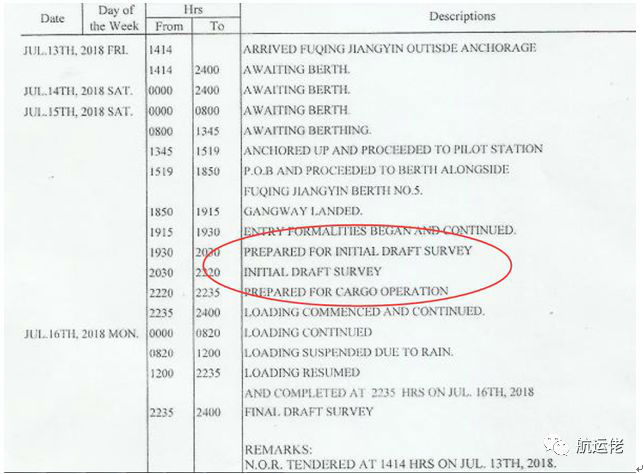
笔者于是草拟如下电邮,对此进行解释说明。
Thanks for your effort, But it’s well settled that once commenced, laytime will continue to run until loading (or discharging ) has been completed. Charterers may refer toLatest 7th Edition《Laytime and Demurrage》Chapter 1-General Principles,1.30 where provides as below. For easy reference, Owners have put in italics and highlighted.
1.30 Once commenced, laytime will continue to run until loading (or discharging) has been completed, or until it expires, if these operations are not finished earlier. In the tanker trade, it is usual to define completion in terms of disconnection of hoses.
And 1.28 provides:
1.28 Once laytime has commenced to run it may nevertheless be suspended either by an interruption or an exception to laytime. The difference between these terms, as used in this book, isthat an interruption to laytime excludes periods outside the definition of laytime as expressed in the laytime clause. Excepted periods are within thedefinition, but expressly excluded. Adverse weather would be an interruption tolaytime expressed in weather working days, but a clause excluding time lost bystrikes would be an exception. The principal difference lies in the fact that,with an interruption, it is only necessary to show that the excluded state of affairs exists, but, with an exception, it is necessary to show a causalconnection between what is excluded and the failure to work cargo.
But pursuant to our Fixture Note, there is no such exception, Therefore laytime will continue to run without any deduction.
As the charterers have no objection that gangway landed, entry formalities, prepared for initial draft survey and initial draft survey etc, There are no any fault from Owners’ side. Refer to《Shipping Law》Chapter 11-Laytime and Demurrage-Suspending laytime at p.232, Where provides:
Once laytime begins, it will run continuously against the charterers unless:
1.There is an express provision in the charter to interrupt the running of laytime,
2.Delay is caused by the fault of the shipowners,
3.The shipowners remove the ship for their own purposes.
Thus laytime at loading port will run continuously against the charterers.
If the charterersmay contend that there are ambiguous, but it’s also well settled in 《Voyage Charters》Chapter 15 Laytime Exceptions 15.23, must be construed strictly, anyambiguous provisions is no protection for the charterers.
1. Strict construction
15.23 In common with all exceptions clauses, laytime exceptionsare to be construed strictly,and an ambiguous provision is noprotection. Many of the principles discussed below are particular instances of this requirement.
Hope above are clear and will be acceptable by the charterers.
关于Laytime计算有一些基本原则,比如已经起算,不会自动终止;除非合同中有明确的条款规定可扣除不算,或者延误是由于出租人的过错引起的,或者在此期间,出租人将船挪做他用;否则将一直连续不断计算到装卸货完成。
最后回到本文所讲的Y轮计算的争议中来,就“weather working day”这一点而已,为了适用这些法律原则,必须先考虑以下几个问题,如《Laytime and Demurrage》Chapter1-General Principles,2.46所说的如下:
2.85 In order to apply theseprinciples, the following questions must first therefore beanswered:
1.Did the weather interruption occur on a workingday?
2.What were the relevant hours ofwork?
3.Did the interruption occur in workinghours?
4.What is the proportion that the interruption bore to the totaldaily hours ofwork?
5.What is that fraction applied to 24 hours expressed in hours andminutes?
即1)天气所引起的中断是否发生在工作日之内;2)相关的工作时间是什么?3)作业中断是否发生在工作时间之内;4)中断时间占每天工作工作时间的比例是多少;5)对比于24小时,中断的时间对应的是多少小时和分钟。
因此,依据Y轮的相关事实记录,可以很好地回答这些问题,中断发生在工作日之内,也发生在工作时间之内。但是合同第10条明确规定,装卸率是基于“weather working day”;而当时的天气不允许进行相关装货作业,因此不属于天气适宜工作日(weatherworking day),需要从laytime计算中扣除相关的中断时间。
1、参考资料:《Laytime and Demurrage》
修改完成于2018.10.17
海运圈聚焦专栏作者 Alex (微信公众号 航运佬)

 2018-10-18
2018-10-18 1956
1956 









